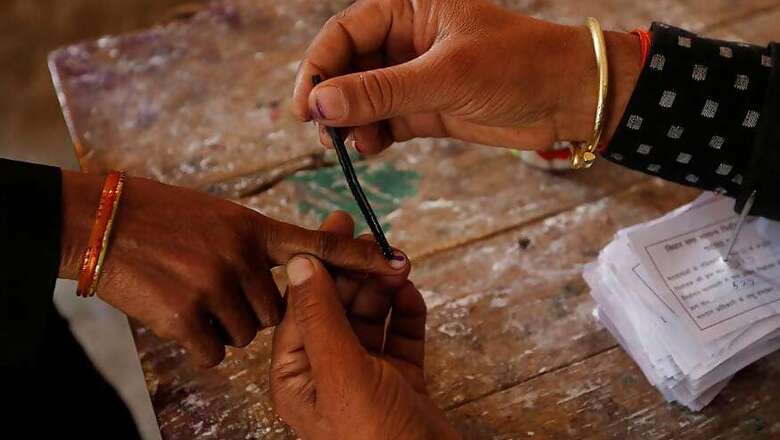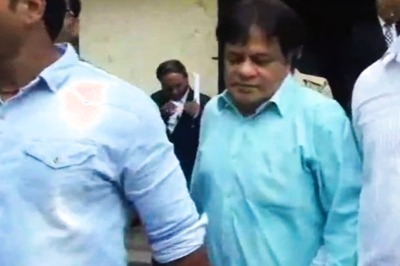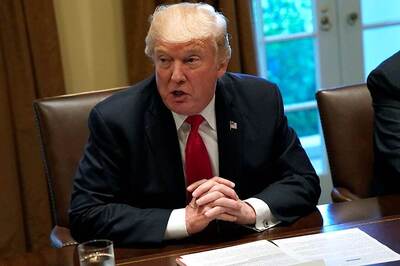
views
New Delhi: Just when Election Commissioner OP Rawat set the cat among pigeons by stating that the Commission would be ready for simultaneous polls by September 2018, he also added a caveat that this would not be possible unless certain “constitutional amendments” were carried out.
In an interview with CNN News18, Rawat said “there hasn’t been a study on what provisions need to be amended. All aspects need to be looked at for making ‘one nation, one poll’ a reality.” He also said that “new conditions need to be accommodated and provided for. What happens if one or two states fall out of cycle? All such circumstances need to be provided for.”
However, constitutional experts and jurists seem to differ. Eminent constitutional expert, Subhash C Kashyap, former Secretary-General of Lok Sabha, said “there is no constitutional amendment required and all that is needed is a political will.”
If the Article 83 (2) and Article 172 (1) of Constitution are taken into consideration, the term “unless sooner dissolved” provides for a situation of simultaneous polls and hence there is no need for any amendment. “No constitutional amendments are required and the reading of both the Sections state that Constitution allows simultaneous polls and dissolving the Assembly before five years, but all that is needed is political motive. Personally speaking, it is very difficult to achieve,” Kashyap said.
The important constitutional provisions in this matter is Article 83(2), which provides for a term of five years for Lok Sabha, from the date of its first sitting, unless dissolved earlier. Similar provisions under Article 172(1) provide for a five-year tenure for state legislative Assemblies from the date of its first sitting.
Echoing Kashyap’s view, PDT Acharya, former Secretary General of Lok Sabha said “this was an impractical proposal by the Election Commission and that no Constitution amendment would be needed.”
“This appears to be a very impractical proposal. Constitution does no need amendment as the wording ‘unless sooner dissolved’ makes it possible to dissolve an Assembly before the expiry of five years, but now Assembly cannot be dissolved like this as they have been elected for a period of five years. When an Assembly is dissolved before their expiration date, it is only on the advice of the council of ministers. There can be a situation where there is a lot of turmoil or the MLAs defect and in such a situation, the government falls and within six months elections have to be conducted. The six-month period has been fixed by the Supreme Court and not the Constitution, so making such a proposal that simultaneous polls can be held is impractical,” said Acharya.
In India, simultaneous elections to the Lok Sabha and Vidhan Sabhas were organized in the years 1951-52, 1957, 1962 and 1967. Thereafter, however, the schedule could not be maintained. Acharya also pointed out an important aspect where the term of the state Assemblies could be made co-terminus with that of the Lok Sabha and highlighted that a constitutional amendment may be required in such a case.
“Now if the tenure of the state Assembly has to be made co-terminus with that of the Lok Sabha, then Constitutional amendments would be required. For example, the point “unless sooner dissolved” can be amended to read that the term of the assemblies shall be co-terminus to that of the Lok Sabha. So the amendment can happen like this. But now if the constitutional amendment is passed by both the Houses by two-third majority, even then this needs to be ratified by half of the states since states are affected by this amendment,” said the constitutional expert.
While parliamentary polls are scheduled for 2019, Assembly elections will be due in eight states after September 2018. Polls in Mizoram, Madhya Pradesh, Chhattisgarh and Rajasthan are slated for the end of 2018 and early 2019. Polls for the remaining four states are slated to be held with the general elections.
The BJP-led government at the Centre has been aggressively pushing for the system of simultaneous parliamentary and Assembly polls.
Acharya said the ruling party was trying to “avoid people and any feeling of anti-incumbency as simultaneous polls would ensure they are not responsible to the people for the next five years.”
“When simultaneous polls happen, the ruling party will come to power in most of the states, and after that for five years they would not be going for any election and they will perhaps not face repercussions of a situation when the wind is blowing against them. If some of their policies go wrong then through simultaneous polls they will be able to escape the fallout. The PM is answerable otherwise,” said Acharya.
This proposal of EC Rawat was also called out by senior advocate Indira Jaising who said the constitutional amendment Rawat is referring to “would destroy the federal structure”.
“The constitutional amendment Rawat is referring to is something which enables the central government to dissolve all the state Assemblies. But such amendment can never happen which gives power to any one authority to dissolve all state governments in one go. What about the states in which BJP is not in power? If they say we want to run for full five years, how can the simultaneous polls happen? There cannot be a central directive on this, nor can the election commissioner direct the states to dissolve their Assemblies,” Jaising said.




















Comments
0 comment